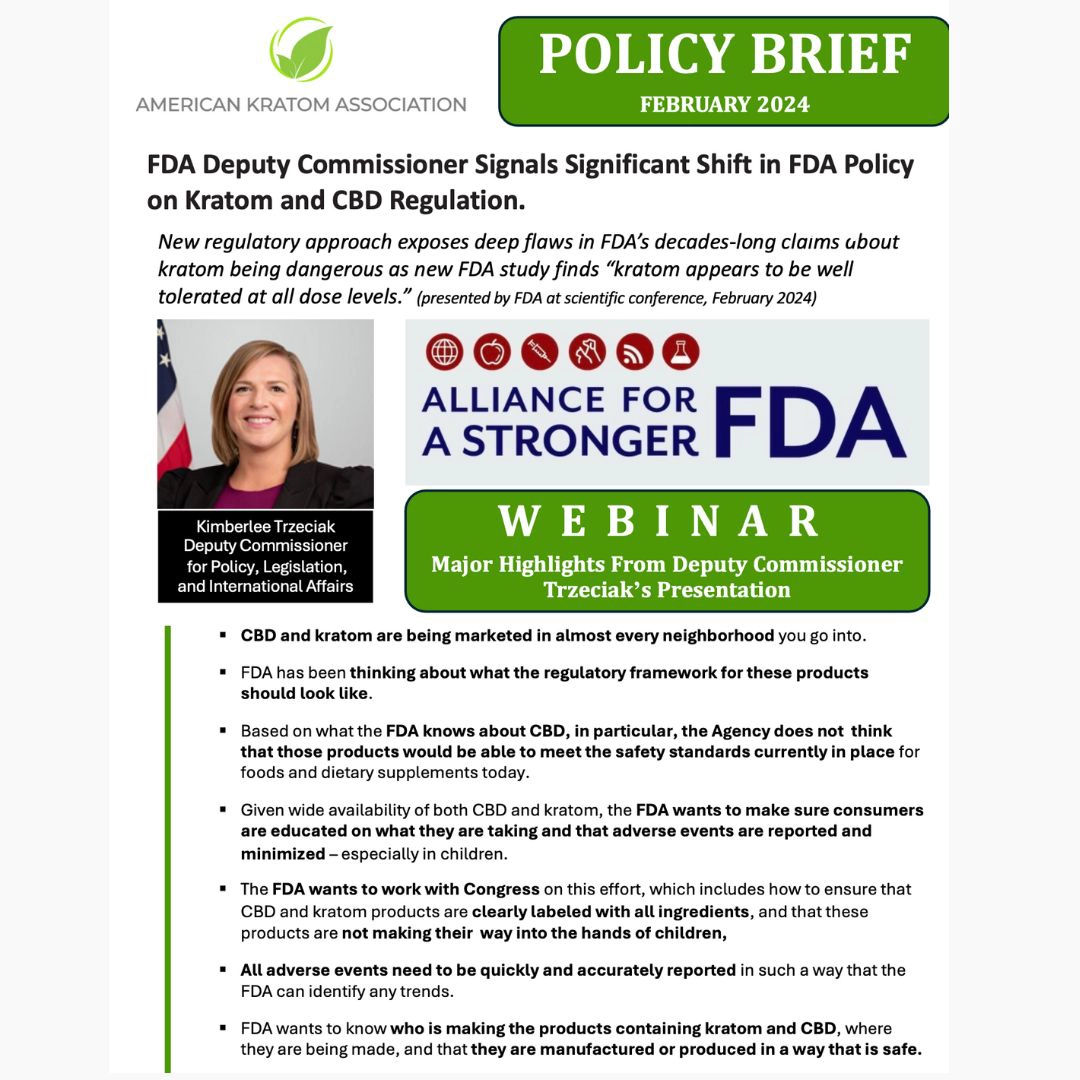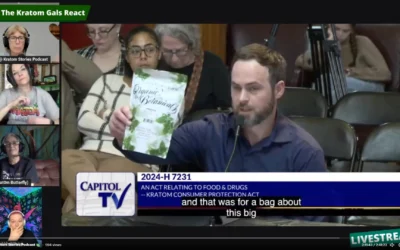FDA Deputy Commissioner Indicates Major Change in FDA Stance on Kratom and CBD Regulation. This new regulatory direction highlights substantial inconsistencies in the FDA’s longstanding assertions regarding the danger of kratom, as a recent FDA study reveals that “kratom is seemingly well tolerated across various dosage levels.”
In 2020, FDA Commissioner Stephen Hahn acknowledged that banning CBD products would be ‘A Fool’s Game.’ Today, we are witnessing progress towards the regulation of both kratom and CBD products, signaling a step in the right direction.
FDA Deputy Commissioner
The recent announcement by the FDA Deputy Commissioner signifies a significant change in the agency’s stance on the regulation of Kratom and CBD products.
This shift in approach marks a departure from the previous policies that were in place, indicating a new direction for how these substances will be monitored and controlled by the FDA. This change is likely to have far-reaching implications for both the industry and consumers, as it could lead to stricter regulations, increased oversight, and potentially even changes in the availability of these products on the market.
The FDA’s decision to reevaluate its approach to Kratom and CBD reflects a growing recognition of the need to address the potential risks and benefits associated with these substances, and underscores the agency’s commitment to ensuring the safety and efficacy of products within its jurisdiction. This new direction not only questions the FDA’s historical stance on the safety of kratom but also suggests a more nuanced understanding of its effects on health.
For years, the FDA has maintained a cautious, if not outright skeptical, view on the consumption of kratom, often citing concerns about its safety and potential for abuse. The agency’s stringent scrutiny has been grounded in claims that kratom poses significant health risks to consumers, frequently emphasizing its purported danger without substantial evidence of harm at controlled dosage levels.
CBD and Kratom Regulatory Framework
However, the revelation from a recent FDA study that “kratom is seemingly well tolerated across various dosage levels” introduces compelling evidence that challenges these long-held beliefs. This study suggests that, under proper regulatory frameworks, kratom could be considered a safer alternative than previously acknowledged, with potential benefits that merit further exploration.
The Deputy Commissioner’s acknowledgment of this study not only underscores a significant shift in the FDA’s regulatory posture but also reflects a broader willingness to reevaluate and adapt policies based on emerging scientific evidence. This statement suggests a willingness to reconsider the possible therapeutic advantages of both kratom and CBD.
It emphasizes the importance of finding a balance between regulating these substances and having a comprehensive understanding of how they work on a pharmacological level. By approaching these substances with an informed perspective, it allows for a more nuanced and potentially beneficial approach to utilizing them for medicinal purposes. This approach acknowledges the potential benefits of these substances while also recognizing the need for proper regulation and oversight to ensure their safe and effective use.
This policy evolution is particularly noteworthy as it exposes the deep flaws in the FDA’s decades-long narrative about kratom’s dangers. By acknowledging the substance’s tolerability at various doses, the FDA is taking a crucial step towards rectifying misconceptions and paving the way for more informed, evidence-based decisions regarding the regulation of kratom and CBD products.
The FDA’s new regulatory approach is aimed at increasing transparency and ensuring that decisions are based on scientific evidence. This means that the agency will be more open about its decision-making process, allowing for greater public input and scrutiny.
FDA’s regulatory efforts
Additionally, the FDA will prioritize scientific research and data in its regulatory decisions, ensuring that any new regulations are grounded in sound scientific principles. This shift towards a more transparent and science-driven process is expected to improve the overall effectiveness and credibility of the FDA’s regulatory efforts.
This process will likely involve a reassessment of the risks and benefits associated with kratom and CBD, taking into account the latest research and data. The ultimate goal would be to establish regulatory guidelines that protect public health while also recognizing the potential therapeutic uses of these substances. Human Abuse Potential Study of Botanical Kratom is a huge step forward to regulating and understanding the way kratom works.
Deputy Commissioner Kimberlee Trzeciak
A quote from Deputy Commissioner Kimberlee Trzeciak at the Alliance for a Stronger FDA webinar series:
“In almost every neighborhood you go to, you can see stores on the corners that are marketing CBD and kratom, and others. And one of the things that we have been thinking through here at FDA, using CBD as an example, is what does the regulatory framework for those products look like? Based on what we know about CBD in particular, we do not think that those products would be able to meet the safety standards that we have in place for foods and dietary supplements today.
What can we do in terms of regulatory tools to ensure that this product is going to be marketed that consumers are clearly aware of what the product is, what is in it, and making sure that we have basic information about the marketplace? I like to think of it as the common regulatory tool that we have across the other products that we regulate.
We want to work with Congress on this effort, but thinking through how do we ensure that it is clearly labeled, so that way CBD is not making its way into the hands of children. For example, how can we ensure that the Agency knows if there are adverse events that are being reported, so we can identify those trends, making sure that the product is being manufactured or produced in a way that’s safe and quality?
Making sure that we know who is making it is what is also very important and where they’re making it. We have been actively thinking through that.
It is really going to take collaboration with the Hill and with stakeholders. I think we have a lot of experience from the other products that we have regulated about what are the basic regulatory tools that we think would be most beneficial, but we also need to have a better sense from the Hill and from stakeholders about where those lines need to be drawn in terms of the safety of the products. What kind of level of oversight do we want for them?
I think one of the most important things, though, is that there is, I would hope, common ground on wanting to make sure that products like, with CBD and Kratom, consumers are educated about what they are taking, and when we have seen some harmful events happen with children. That is something that we want to make sure of, that if we are going to move forward on a regulatory framework, we are doing it in such a way that we are hoping to minimize some of those events.”
Conclusion
The FDA Deputy Commissioner’s indication of a major change in stance on kratom and CBD regulation is a pivotal moment in the ongoing debate surrounding these controversial substances. This shift in perspective signals a potential shift in the regulatory landscape, with implications for both consumers and industry stakeholders.
The FDA’s evolving position on kratom and CBD could have far-reaching effects on the availability, marketing, and use of these products. It also underscores the importance of continued research and dialogue to ensure that regulations are based on sound science and public health considerations.
Overall, this development highlights the dynamic nature of drug regulation and the need for ongoing vigilance and engagement from all parties involved. It signals a move towards more evidence-based policy-making and opens the door for a more balanced and informed dialogue about the future of kratom and cbd in the United States.






0 Comments